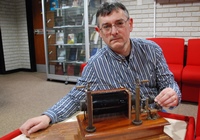£750,000 to study how science fiction writers and readers anticipate the future

Professor Iwan Morus with an induction coil which were in use from the 1830s. Between around 1890 and 1920 they were used to generate high voltage to create electromagnetic (radio) waves.
30 January 2015
Professor Iwan Morus from the Department of History and Welsh History at Aberystwyth University, along with researchers from York and Newcastle universities, has been awarded £750,000 to study how science fiction writers and readers during the 20th century anticipated the future through new scientific developments.
The study, Unsettling Science: expertise, narrative and future histories, is being funded by the Arts and Humanities Research Council (AHRC).
The three year project will investigate the relationships between science, fiction and popular culture over the course of the long technological 20th century (1887-2007), focusing on how innovations in science, technology and medicine have been used by writers, policy-makers and the general public to anticipate and think about the future.
Joining Professor Morus on the project will be Dr Amanda Rees from York University, who leads the research, and Newcastle University’s Dr Lisa Garforth.
Each researcher will work on different periods to explore how new scientific developments conditioned cultural understandings of the present and constructions of the future - the late Victorian period, post second world war period and at the turn of the 21st century.
Professor Morus will be leading on research into the technologies and performances that were used to imagine the future at the turn of the 20th century and the culture of futurism that flourished in books and magazines, fiction and non-fiction during the late Victorian and Edwardian period.
Professor Morus said; “I will look at the optimism and excitement era of the innovations in physics and experimental cultures during the late Victorian and early Edwardian period.
“The overall aim is to show how science has been a source of unsettling social change as new knowledge opens up new possibilities, anticipations and hopes but also new fears, conflicts and unintended consequences.
“At the same time, we will explore how fiction and culture more broadly has unsettled scientific certainties by making science a source of entertainment, wonder and pleasure, and enabling readers and publics to challenge expert knowledge by asking difficult questions about the ethical, social and political implications for the future.”
As part of the research, Professor Morus will also be calling on anyone with an interest in this study to get involved through an interactive website and science fiction reading groups, which will enable individuals to comment and critique both the process and results of the research.
More information on these will be available in the autumn of this year when the research gets underway.
Professor Iwan Morus is a Professor of History at the Department of History and Welsh History at Aberystwyth University.
He is a historian of science and technology with particular interests in the history of communication technologies and in technology and popular culture.
He has published extensively in these fields and has successfully overseen research projects such as Science and Culture in Nineteenth-century Wales, funded by the University of Wales Board of Celtic Studies.
AHRC
The Arts and Humanities Research Council (AHRC) funds world-class, independent researchers in a wide range of subjects: ancient history, modern dance, archaeology, digital content, philosophy, English literature, design, the creative and performing arts, and much more. This financial year the AHRC will spend approximately £98m to fund research and postgraduate training in collaboration with a number of partners. The quality and range of research supported by this investment of public funds not only provides social and cultural benefits but also contributes to the economic success of the UK. www.ahrc.ac.uk
AU4415



